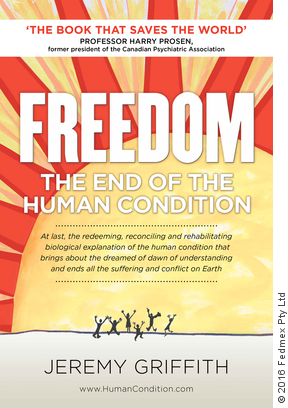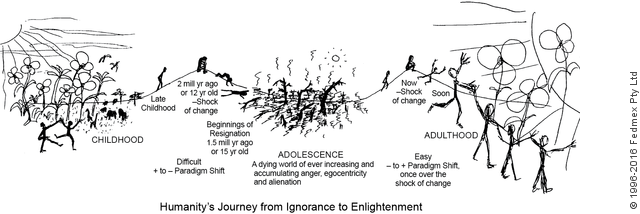An insight into the amazing journey FREEDOM
takes you on—from a discussion between new
WTM member, Paul, and WTM founding members
Tony Miall and Genevieve Salter
(To learn more about Paul, see the ‘Commendations’ section on our
WTM Home page at www.humancondition.com/#commendations)
Paul: I’ve printed this sucker out [Jeremy Griffith’s book FREEDOM: The End Of The Human Condition] and I’ve wrestled with it. It’s quite something, it really is. It’s amazing. It is the most profound piece of work I’ve ever read and I’ve read a lot. I think Jeremy is—having never met the man—I think he is honestly a living prophet. I would love to meet him one day in fact, I really would.
I stumbled across it maybe 18 months ago or something like that and it was gripping—confronting and gripping—and I am very aware of the fact that a lot of people have found it confronting and I’m certainly one of them. An alarming and confronting and difficult concept to get your head around. But, yeah, it’s been an interesting journey, it’s been a very interesting journey as it has been for all of us, I’m sure.
I’m still, well we’re all still, on the journey but I’m certainly committed and I think it is honestly a work of pure genius. The depth of his knowledge and the resources that he is able to draw upon to put this thing together—it is honestly a piece of genius because of, on many levels, his ability to draw upon the resources of his brain. His brain is alarming, clearly. To be able to draw on Plato, the Bible and then Jim Morrison and Bono and put it all in perspective. It is honestly an astonishing piece of work. I think more than anything it has to be realised that the man is incredible.
Tony: And Jeremy would be the first to tell you that he’s by no means a genius. He basically thinks very simply and is not affected by the human condition. But you’re right, it is an incredible thing that he’s worked out. Anyway, I remember the first time I read it the reaction I had was something similar to the way you just described it. It was just like someone pulled the blinds down and everything was quite clear.
Paul: My eldest is a highly intelligent young woman who wants to become a psychologist and I’ve encouraged it because in my innocence I’ve said ‘well, we’re going to need psychologists because the world’s getting crazier and crazier’. That was before I read this book and had the insightfulness—you know truth—shape my perspective which it has done clearly. And I’ve encouraged her to read it, and she hasn’t. I’m saying, ‘listen, if you read this book you don’t need to go to university’. So, she’s still going to go to university because, I think you know, it takes time.
I’ve read this book in earnest, I really have, as we all have, with using it as a tool to think about our own lives. Using this wonderful information, it’s an incredible tool for life, it’s like ‘The Tool Box of Life’ and putting it into perspective. Like I’ve read this book and I’m scribbling, and I’m writing stuff down. As we all did, you go through it and you’re thinking about your own situation and you’re scratching stuff down and writing notes and trying to remember it and then you forget it and try to find that stuff again that you read. Like any good book it has such an impact on you that you want to remember it but the human brain is limited to an extent that you don’t remember it and you have to sort of, you know, and getting older doesn’t help.
Tony: The beauty of it too—I keep dragging this picture out because it’s my favourite thing just about [see image above]—is the ability to think that this information gives you. It gives you the ability to think on a macro level and that is actually the answer. That’s the answer to the problem. Basically people say in their day-to-day, ‘think macro or outside the box’ or whatever. No one can actually do it but they sort of know that it’s the answer. I just always think about everything that we talk about every day—the pain, the suffering, our own psychosis, our own problems, the way we are—everything belongs in this mess in the middle here [points to the middle ‘adolescence’ stage in the above image] and until now that’s where it has stopped. But now we’ve got this potential because of this information. It actually gets us out of there and starts to look to the future. There’s a sort of a temptation there, and a normal one as well, to try and repair ourselves and really get to the bottom of our own psychosis. And we could do that and we could individually spend the rest of our life trying to do that and we might get somewhere right at the very end. But the beauty of it is that the way to really heal the world is to get the information out there, and the best way to get it out there is to understand it enough that we know it’s true and then live in support of that understanding. I mean it’s quite, like you said, it’s the most profound thing you’ve ever read.
Paul: The concept of Jeremy being innocently outside the human condition. It’s almost like he was flying above it looking down and going, ‘ahh, what are you doing?’ ‘Why are you guys fighting?’ There’s England and there’s France and there’s Iraq. It’s a wonderful perspective for me to think about looking down at all these people interacting and loving and hating and having sex and you know fighting. This concept of flying above it and looking down is an interesting parallel to what I see Jeremy has done to planet Earth, he’s looked at it with such clarity.
Genevieve: Thankfully we’ve got a future, an exciting future to look forward to. I mean, that’s the only thing that brings any relief to anyone’s situation is being able to understand the human condition, so thank God we’re at this point.
Paul: Thank Jeremy.





